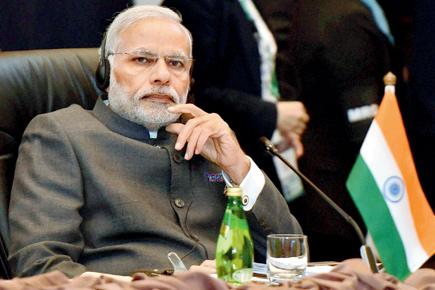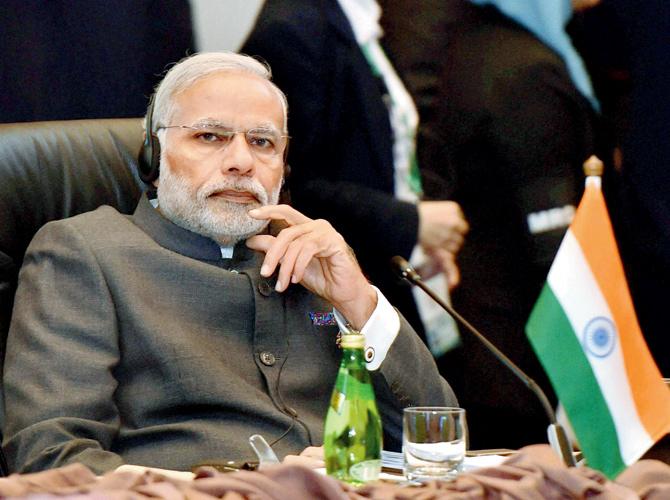What's with Prime Minister Narendra Modi? In the past two weeks, in various speeches, he has raised the standard of combating terrorism

Narendra Modi
 What’s with Prime Minister Narendra Modi? In the past two weeks, in various speeches, he has raised the standard of combating terrorism. True, this is the period in which horrific attacks were carried out in Paris, Bamako and Beirut, but nothing unusual has happened in India. Indeed, there has been no major development on the terrorism front in India since 2008, which saw the Mumbai attacks and the bombing campaign of the so-called Indian Mujahideen.
What’s with Prime Minister Narendra Modi? In the past two weeks, in various speeches, he has raised the standard of combating terrorism. True, this is the period in which horrific attacks were carried out in Paris, Bamako and Beirut, but nothing unusual has happened in India. Indeed, there has been no major development on the terrorism front in India since 2008, which saw the Mumbai attacks and the bombing campaign of the so-called Indian Mujahideen.
Wherever he goes, his emphasis, at least as reported in Indian newspapers, seems to be on fighting terrorism. In his Singapore lecture on Monday, the PM launched a broadside against terrorism, declaring that it could derail economies, and said that countries [read Pakistan] providing sanctuaries to terrorists must be held accountable. Speaking at the 18-member East Asia Summit (EAS) in Kuala Lumpur on Sunday, he called for “a new global resolve and new strategies” to combat terrorism. Later, addressing the diaspora, he termed terrorism as “the biggest threat to the world.”

Speaking at the 18-member East Asia Summit (EAS) in Kuala Lumpur, Modi called for “a new global resolve and new strategies” to combat terrorism. pic/PTI
Even before the Paris attack, Modi had flagged the issue when he told British parliamentarians that “the world must speak in one voice and act in unison to combat this challenge of our times”, and called for the adoption of a comprehensive convention on international terrorism at the United Nations “without delay.”
Following the Paris attack, the prime minister joined world leaders in condemning it, and in an intervention during the G-20 working dinner on November 15, he spoke out emphatically against terrorism. Referring to the rise of the IS, he pointed out that “old structures of terrorism [read Lashkar-e-Tayyeba] remain” and that “there are countries that still use it as an instrument of state policy [read Pakistan]”.
This is surprising because in the last seven years, Pakistan-backed terrorism has actually declined sharply. A look at the statistics in the South Asia Terrorism Portal show that the bulk of what passes off as terrorist violence in India is related to the Maoists in central India and the various insurgents of the North-east. In Jammu & Kashmir, violence aided by Pakistan is down sharply. As compared to 103 security personnel killed by Maoists and in the North-east, the total is 38 in J&K and eight in other parts of the country.
The story was similar the year before, in 2014. Some 110 security personnel were killed in central India and the North-east, as compared to 51 in J&K and zero in other parts of India. ‘Those killed in other parts of India’ is an important category since this usually includes terrorists who operate under the direction of Pakistani parties. But the last time this category meant something was in 2008, when 337 people died in other parts of India, with 166 being killed in the Mumbai attacks and others in bombing campaigns in New Delhi, Jaipur and Ahmedabad.
Now, it is well known that the Maoist violence and North-east issues have domestic origins and are not quite connected to the global terrorism that the PM seems to be talking about. J&K is a category in itself, but it was just last week that
K Rajindra, the director general of police said at a press meet that both crime and terrorism were declining in the state and that the instances of Islamic State flags were more an attention-grabbing stunt than any indication of the spread of the Daesh ideology.
So, what accounts for Modi’s over-the-top attempt to become a world leader in fighting the terrorist menace everywhere? In all fairness, one part of it has to do with the events of the times, notably the Paris attack. But while it is one thing for New Delhi to condemn the attack, there is little India can do to assist France and the international community to fight the Daesh, since India is itself not affected by the Islamic State phenomenon. Modi’s prescription, made in the speech to the East Asia summit, that there was need to delink terrorism and religion is misleading, because the Daesh, indeed, has everything to do with Islam, or an interpretation of it. It is important to understand the challenge of Islamism, given the nature of Islam as a faith which adheres to a book which is considered the word of God and which does contain statements and declarations that have encouraged the Islamic State to enslave and behead people and visit all kinds of barbarity on them.
One answer that comes to mind is that terrorism is proving to be a convenient handle for Modi to bash Pakistan. Terrorism has clearly become the most important filter through which the Modi government views Pakistan. As we have indicated, this seems a bit odd, given the decline of Pakistan-backed violence. Indeed, this fact could have served to engage Islamabad, instead, a loud campaign has been launched which does not seem to be getting much traction anywhere.
The other is that it helps Modi to paper over his other failures, notably in carrying out the transformative reforms he had promised the country and the world. Given his outsize self-image, he, therefore, seems to be keen to use it to establish his standing as a global leader of consequence. But he is ploughing a path which has been well trod, especially on the issue of terrorism. The global convention on terrorism that he has been raising time and again recently is a measure that India has been pushing in vain since 1996, and we are no nearer to it today, than we were then.
If Modi wants the attention and adulation he received in the past year to continue, he has to avoid the shortcuts of ringing declarations and slogans. He needs to buckle down to the self-same reforms that made India — and Modi as its leader — attractive to the global community in the first place.
 Subscribe today by clicking the link and stay updated with the latest news!" Click here!
Subscribe today by clicking the link and stay updated with the latest news!" Click here!







